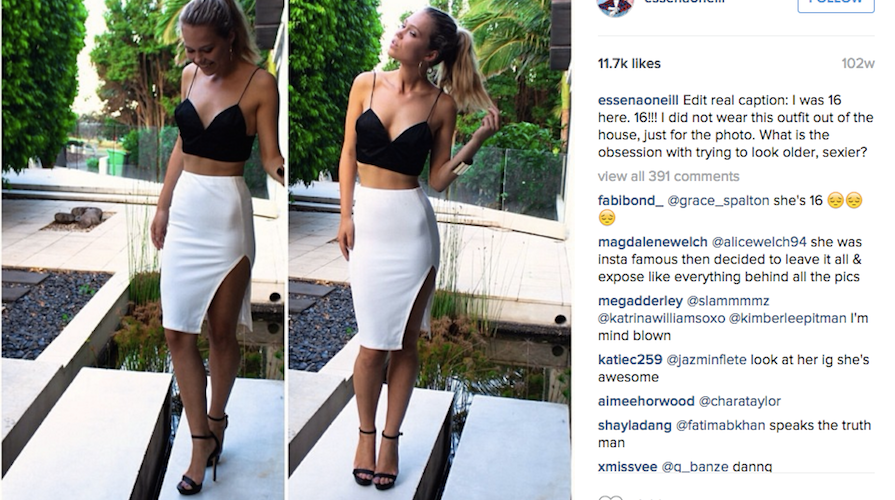Social Media - Do with it what you will...
- Polly Johns
- Nov 4, 2015
- 5 min read
In the height of social networks’ popularity, the number of children and teenagers seeking help for an eating disorder has risen by 110% in the past three years according to The Independent. Indicating that body image issues are soaring, un-coincidentally at the same time certain companies are growing and using social media stars to endorse their products, ultimately allowing young people to believe that in some way, they are insufficient.
The likes of Twitter and Facebook promote an unrealistic ideal of life, body image and personal relationships. An example of this false advertising of life is Jay Alverrez, a Hawaiian model and extreme sports enthusiast, who travels the world with his equally beautiful model girlfriend Alexis Ren.
Together they film every supercar, skydiving, snowboarding, free running, jumping from a hot air balloon moment of madness, not forgetting the odd puppy thrown in for good measure, throw it all together with some music and they have themselves a hit YouTube video with over 11 million views. And obviously living this crazy life, it is essential to include your brown, toned, beautiful bodies whenever possible.
It is apparent that their lives are enviable, but the truth is they are unrealistic. They allow young social networkers to believe that by the age of 20 it is attainable to have completed their bucket list twice over. They are advertising their lives through social media, shared and retweeted all over the world, usually under the hash tag ‘♯goals’, which only generates the pair more money. The more people that click on their YouTube videos, the more they get paid for advertising and endorsing products. If anything, it is proof that it is possible to start a career through social media.
However, it isn’t only Alverrez and Ren that endorse this fantasy life; magazines, celebrities, television shows, and advertisements all contort young minds into thinking there is a correct way to live, correct way to look, and correct way to think. The issue is that this problem is difficult to fix. It is impossible for the media to represent every single person’s life; how can they when there are 7.3 billion people in the world each with a different image of perfection? The only way that could possibly show young people the truth is if they confessed that the imagery shown is a lie.
Essena O’Neill is trying to do just that, by creating awareness that ‘social media isn’t real’. Essena is an Australian model who created an instagram career in her teens by promoting products to her thousands of followers. However, after three years she decided to abandon her social media presence, claiming that she “used to be obsessed with being 'followed' or being liked” after realizing this she renamed her Instagram account “Social Media Is Not Real Life.” Not only did she rename her account, but also deleted thousands of photos and re-captioned many of the remaining few, revealing the truth about each one. Most of the seemingly natural photos were revealed by Essesna to be a manufactured version of the truth to sell the product she was wearing. Companies would pay her over $500 just to wear one item of clothing; she claims she would take over a hundred shots to get the right one. As of the 4th of November she has made her instagram account private, and set up the website “letsbegamechangers.com” promoting veganism and ethical values.
However the fact is that even with the truthful captions young people still will buy a product if it is endorsed by a celbrity. In a recent survey on celebrity endorsement, conducted by Brand Republic, it was revealed that 40% of 16-24 year old females purchase celebrity endorsed products and 1 in 5 of them doing so on a regular basis. This is because they trust the person they are following to give authentic and truthful reviews. A social influencer can drive traffic to a companies site whatever they are trying to sell. This will ultimately create thousands of sales from just one picture that has been posted by one influencer.
Kristen Matthews is the marketing and community manager of Group High (Blogger Outreach and Influencer managment software) she noted the importance influencers have on a brand in todays market, making the judgement that "modern day consumers are blind to billboards and deaf to commercials. They are self-sufficient and want to research a brand on their own and hear about it from someone they trust." These people are the Essena O'Neill's and Jay Alvarrez's of the world. They are people consumers trust, the people that tell the consumers what purchases to make in order to live the life they desire, the one they see on instagram everyday. The consumers want to follow, they want to trust, they want to imitate.
Since O’Neill’s story went viral, she has received criticism from others who have created careers through social networking claiming that it is what you make it, not what it makes you. Zack James is one of them, and shared his opinion on Essena’s story with his 12,000 followers. He said: “Essena O’Neill is wrong; Social Media isn't a lie… The inability to define yourself, your life, your own sense of confidence comes from a lack of trying to understand yourself. Blaming Social Media, calling it a lie, further shows your lack of attempt to understand yourself.” He said that he and many others found themselves through social media, as they had the ability to ‘speak with our own true voices’.
The irony with Essena’s campaign is that social media is still being used to promote the ‘truth’, something that Zack James also commented on “deciding to use Social Media as a tool to tell people Social Media is a lie contradicts that very same notion.” He added: “Social Media isn't a lie, you were the lie.”
Social media has become more than anyone would have expected, people can literally become overnight stars. Promoting yourself through this medium is an excellent use of the product that is given to you on a plate from the age of 13, but it can also be dangerous. It is easy to understand where Essena is coming from, in that she is trying to show the reality behind each picture by adding a truthful caption, so that young girls are not forced into believing that what they see on instagram is real. However, to agree with Zack James, it is not fair to blame social media for the decisions she has made, nor to promote herself further through other forms of social media to gather more of a following.
The danger but beauty behind social media is that people have the freedom to make it whatever they choose, truth or lies; it is out there for others to make their own judgment. As with anything in the UK if product placement is used, it should be made aware of. If Photoshop is used, it should be mentioned. If it is not real life, it should be known. But its not; and possibly never will be.





























Comments